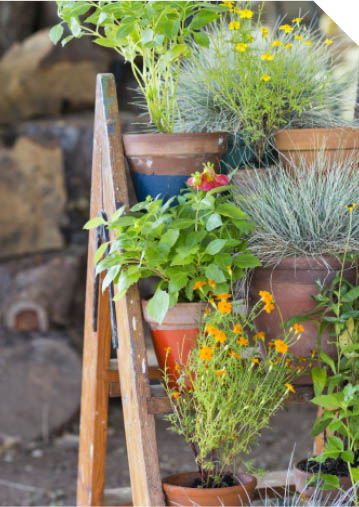 AN AFTERNOON
AN AFTERNOON AN AFTERNOON
AN AFTERNOON
An old wooden stepladder makes a great prop and a clever spacesaving device to show off your most prized potted plants. A rustic old set of steps becomes exciting when offset by the striking use of a modern color palette of plants. I have used bright colors to make this feel a little more tropical and edgy, but it would work equally well with a cottage-garden theme in pastel colors. You could paint the ladder a neutral or dark color, like navy blue, to offset the bright plants, but for added heat, try a splash of bold paint—royal blue, bright red, or orange. Or, if you have the space (and the ladders), all three together could look fantastic when crammed with plants! Or just paint the pots!

An old wooden stepladder
Exterior multisurface paint in your favorite color (optional)
Brackets and bolts for securing the ladder to the wall or floor
A lot of terra-cotta pots (various sizes are fine)
Soil
An exciting mix of bright-colored plants and contrasting plants
Try a second set of display pots for the winter months, focusing more on foliage and evergreen species such as evergreen ferns, Ruscus, Skimmia, Vinca, Phormium, conifer species, or evergreen grasses
1.If painting the ladder, do so first.
2.Place the ladder where you intend to display it. The plants should be the main focus, so think about the backdrop carefully. A neutral wall will enhance the floral display. Also think about the ladder’s placement in practical terms; you don’t want to be tripping over it and creating a terracotta mess, so put it where it can be easily seen but doesn’t interfere with any activities.
3.Attach it to either the wall or the floor in order to ensure it stays securely in place. Use brackets that attach to the ladder and the wall or floor and bolt into place securely.
4.Half-fill the pots with compost and then add the bright-colored plants and contrasting plants of purple or silver—the more pots, the more impact your display will have. For a modern feel, keep pots to a neat minimum; choose a certain number per shelf and stick to it. For example, three works well because odd numbers always look more pleasing.
5.Arrange the pots so that the tallest plants are not impinging too much on the plants above. Make sure the color arrangement is balanced, with bright colors evenly spread out. The plants on the top rungs will probably get more intense sunlight than the those on the lower rungs.
6.Water regularly. Feed flowering or even fruiting plants such as geraniums, tomatoes, peppers, marigolds, black-eyed Susans, and dahlias throughout the season with a high-potassium liquid feed.
A gorgeous mix of bright-colored plants
Red hot pokers
Verbena
Geraniums
Begonia
Black-eyed Susans
Zinnia
Gazania
Crocosmia
Dahlias
Helenium
Elymus
Salvia
Lobelia cardinalis
Papaver
Hedera helix ‘Goldheart’
Thunbergia alata (these last two are great for cascades)
Echinacea
Contrasting plants
Bright colors can be a bit much unless tempered with something that offers a relief for the eye. Try:
Purple sage
Allium
Senecio cineraria
Melianthus major
Purple cabbage
Lavender
Salvia nemorosa
Perovskia
Eryngium
Artemisia